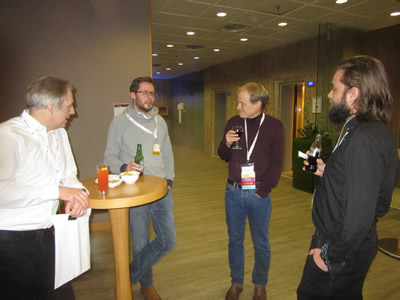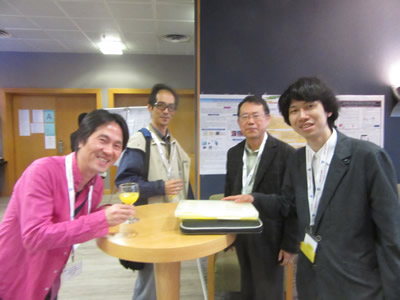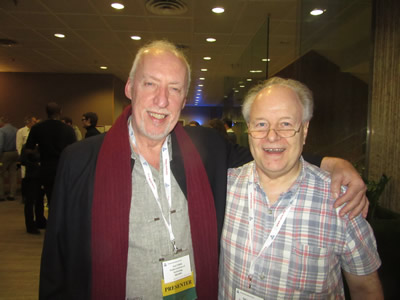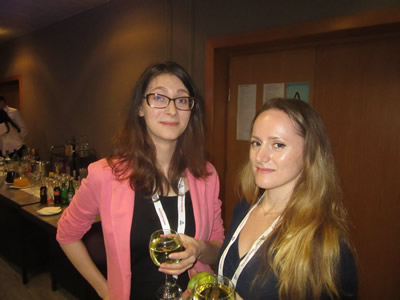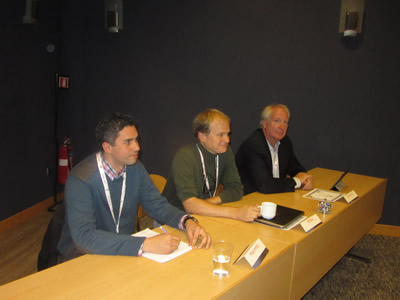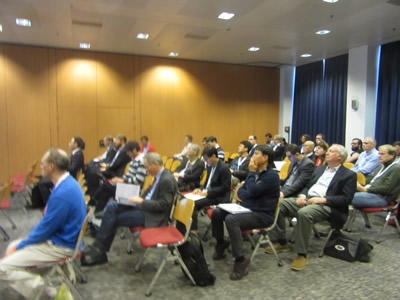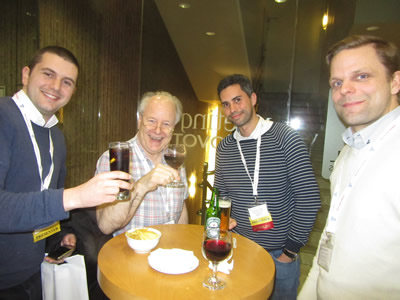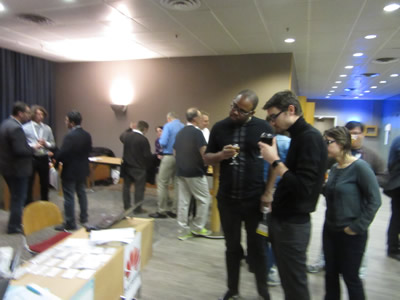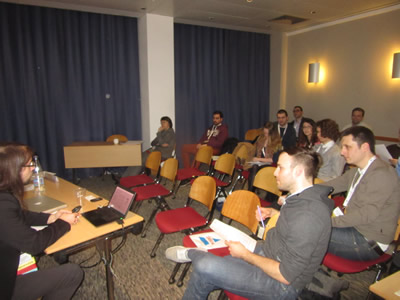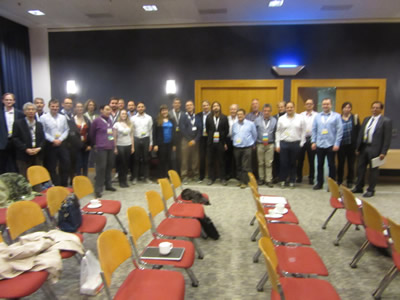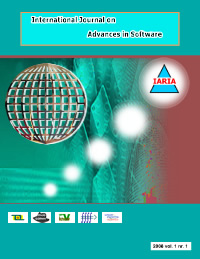FASSI 2021 - The Seventh International Conference on Fundamentals and Advances in Software Systems Integration
November 14, 2021 - November 18, 2021
FASSI 2021: Call for Papers
Onsite and Online Options: In order to accommodate a large number of situations, we are offering the option for either physical presence or virtual participation (pdf slides or pre-recorded videos).
“For every line of code that developers write, they reuse thousands of lines written by someone else. … Each component makes assumptions about the structure of the environment in which it is to operate. Most if not all of these assumptions are implicit, and many of them are in conflict with each other…virtually all of our serious problems can be traced back to places where these assumptions were in conflict” (Garlan, Allen et al., 1995)
Conference Motivation
The integration of computer software systems is a costly (Goodwin 2011) and time-consuming activity and failure has consequences beyond technology. A survey of organisations in 2006 reported that more than half declared that difficulties integrating software systems was an obstacle to expansion (CommServer, 2007). In 2012 a £1.6bn deal to merge two banks failed after two years in a large part because of problems integrating their computer software systems (BBCNews, 2012). Furthermore, the problem of software integration is a technical debt (Nanette et al. 2010) that acts as a constraint on the growth of an organisation because each new software system must somehow work with those already in operation. A new software system can be rejected because the project must bear an overhead that arises from the need to integrate with other software systems.
Computing is ubiquitous and software systems have been an integral part of business for decades. The popularity of technologies such as the Internet, XML (Goodwin, 2011) and SOAP (Dai, Liang et al., 2011) mean that data are regularly exchanged both within and between organizations.
The integration of software systems is not a new problem, so why is it then that software integration remains so problematic and failure continues to occur?
The problem of software integration is multi-faceted. The question of whether to undertake the integration of two software systems is not always a matter of choice on the part of an organisation. There are many reasons for such integration and the drivers come from a number of sources both within and outside an organisation (Dunbrack and Holland, 2008). There are benefits from the integration of software systems and these are not only technical in nature. Fonseca & Rodrigues (Fonseca and Rodrigues, 2011) observe that patients in a hospital will benefit from increased speed and accuracy of clinical decision-making if data is shared between hospital computer systems. There are also risks. Dai et al. (Dai et al., 2011) warn that because each group of software users has their own particular set of requirements, conflicts between these requirements introduce barriers to success.
The problem of software integration is multi-dimensional. We might think of the problem as:
• A problem of data concerned with structure (Goodwin, 2011) and exchange (Dunbrack and Holland, 2008)
• A problem of responsibilities concerned with function and location (Hohpe, 2012)
• A problem of organisation (Abdullah, Mamun et al., 2011) concerned with suppliers (JISC, 2007), software development teams (Silva and Loureiro, 2011) and power (Granlund, 2003)
• A problem of communication (Hohpe, 2012) concerned with standards (Goodwin, 2011) and assumptions (Garlan et al., 1995)
• A problem of cost concerned with best-in-breed (Goodwin 2011) and reuse (Garlan et al. 2009)
• A problem of security concerned with access (Dai et al. 2011) and trust (Frank 2012)
Furthermore, each dimension is not independent. A problem of organization, such as the use of a new software supplier can lead to problems of data, responsibility and communication. A problem of communication, such as the misinterpretation of an interface, or a problem of data, such as the misuse of a data structure, can lead to increase in the cost of software development. Consequently software integration is also a complex problem.
The problem of software integration is likely to continue for the foreseeable future (Garlan et al. 2009). The Internet presents a challenge because the number and variety of connections between software systems will increase. The data exchanged between software systems across the Internet is not under the control of a single group or organisation. Each exchange of data is subject to rules about data structure and data semantics that can change without notice.
Conference Objective
Evidently, software integration is an important activity but there are many such problems and failure is costly. Despite a legacy of projects over decades and the likelihood of continued if not increased connectivity between software systems in the future, there is little by way of a sound theory as to the cause of the problems of software integration and how we might address them.
On the surface the question of how to integrate two software systems appears to be a technical concern, one that involves addressing issues, such as how to exchange data (Hohpe 2012), and which software systems are responsible for which part of a business process. Furthermore, because we can build interfaces between software systems we might therefore believe that the problems of software integration have been solved. But those responsible for the design of a software system face a number of trade-offs. For example the decoupling of software components is one way to reduce assumptions, such as those about where code is executed and when it is executed (Hohpe 2012). However, decoupling introduces other problems because it leads to an increase in the number of connections and introduces issues of availability, responsiveness and synchronicity of changes (Hohpe 2012).
The objective of this conference is to work toward on understanding of these issues, the trade-offs and the problems of software integration and to explore strategies for dealing with them. We are interested to receive paper from researchers working in the field of software system integration.
We solicit both academic, research, and industrial contributions. We welcome technical papers presenting research and practical results, position papers addressing the pros and cons of specific proposals, such as those being discussed in the standard fora or in industry consortia, survey papers addressing the key problems and solutions on any of the above topics short papers on work in progress, and panel proposals.
Industrial presentations are not subject to the format and content constraints of regular submissions. We expect short and long presentations that express industrial position and status.
Tutorials on specific related topics and panels on challenging areas are encouraged.
The topics suggested by the conference can be discussed in term of concepts, state of the art, research, standards, implementations, running experiments, applications, and industrial case studies. Authors are invited to submit complete unpublished papers, which are not under review in any other conference or journal in the following, but not limited to, topic areas.
All topics and submission formats are open to both research and industry contributions.
FASSI 2021 conference tracks:
Hot research/industrial areas
Integration-centric design; Maintenance and (safe) evolution; Software quality assurance; Variability modeling; Empirical studies challenges in system integration; Effective live cloud migration; Big Data, Fast Data and Data Lake in system integration; Vulnerabilities in software product lines; Constraints for product lines; Integration via contract Interfaces; Interface-based similarity analysis in component-reuse; Component Interactions impact; Cyber-physical features in system integration; Reusable software strategies; Synchronizing software variants; Evolving software ecosystems; Component semantic similarity analysis; Security variability; Industrial lessons; Customer considerations on post-integration features
Process Integration
Software Dependency; Interfaces; System Integration; Tools and Techniques; Middleware; Communication and Protocols
Data Integration
Data Exchange; Security, Privacy and Trust; Data Modelling and Database Design; Transformation
Organizational Issues
Software Release Management; Software Migration; Third Party Software; Legacy Software; Software Testing; Software Architecture and Standards; Software Project Organization; Team, Organization and National issues
Management and Control
Software Project Management; Costs and Benefits; Software Risk Management; Ownership and Control; Impact Analysis; Stakeholder Analysis; Complexity; Change Management
Modelling & Understanding
Software Modelling; Expert Knowledge; Software Components; Software Understanding; Symptoms; Cause and Effect; Architectural Mismatch; Topology; Reverse Engineering; Multi-Paradigm Modelling; Abstraction; Motivation and Drivers; Assumptions, Awareness and Conflict; Model Transformation
Programming and Design
Software System Design; Software Development Lifecycle; Programming Languages and Concepts; Patterns; Reuse
Applications
Case Studies; Choices and Trade-offs; Lessons Learned
Deadlines:
Submission | Sep 25, 2021 |
Notification | Oct 12, 2021 |
Registration | Oct 25, 2021 |
Camera ready | Nov 01, 2021 |
Deadlines differ for special tracks. Please consult the conference home page for special tracks Call for Papers (if any).
INSTRUCTION FOR THE AUTHORS
Authors of selected papers will be invited to submit extended versions to one of the IARIA Journals.
Publisher: XPS (Xpert Publishing Services)
Archived: ThinkMindTM Digital Library (free access)
Prints available at Curran Associates, Inc.
How to submit to appropriate indexes.
Only .pdf or .doc files will be accepted for paper submission. All received submissions will be acknowledged via an automated system.
Contribution types
- regular papers [in the proceedings, digital library]
- short papers (work in progress) [in the proceedings, digital library]
- ideas: two pages [in the proceedings, digital library]
- extended abstracts: two pages [in the proceedings, digital library]
- posters: two pages [in the proceedings, digital library]
- posters: slide only [slide-deck posted on www.iaria.org]
- presentations: slide only [slide-deck posted on www.iaria.org]
- demos: two pages [posted on www.iaria.org]
FORMATS
Only .pdf or .doc files will be accepted for paper submission. All received submissions will be acknowledged via an automated system.
Final author manuscripts will be 8.5" x 11", not exceeding 6 pages; max 4 extra pages allowed at additional cost.
Helpful information for paper formatting for MS Word can be found here.
There is a community provided LaTeX template: the CTAN package iaria (with full IARIA formatting rules, including IARIA citation style, but for providing citation style it is tightly bound to pdflatex+biblatex+biber). In addition, there is also iaria-lite (not bound to pdflatex+biblatex+biber, but compatible with any TeX stack; thus, it cannot provide the IARIA citation formattings, but only the titlepage and content-related IARIA formatting rules). Based on the iaria package, there is a minimal working example as Overleaf template. When you are using the LaTeX templates, please still adhere to the additional editorial rules.
Slides-based contributions can use the corporate/university format and style.
Your paper should also comply with the additional editorial rules.
Once you receive the notification of contribution acceptance, you will be provided by the publisher an online author kit with all the steps an author needs to follow to submit the final version. The author kits URL will be included in the letter of acceptance.
We would recommend that you should not use too many extra pages, even if you can afford the extra fees. No more than 2 contributions per event are recommended, as each contribution must be separately registered and paid for. At least one author of each accepted paper must register to ensure that the paper will be included in the conference proceedings and in the digital library, or posted on the www.iaria.org (for slide-based contributions).
CONTRIBUTION TYPE
Regular Papers (up to 6-10 page article -6 pages covered the by regular registration; max 4 extra pages allowed at additional cost- ) (oral presentation)
These contributions could be academic or industrial research, survey, white, implementation-oriented, architecture-oriented, white papers, etc. They will be included in the proceedings, posted in the free-access ThinkMind digital library and sent for indexing. Please submit the contributions following the instructions for the regular submissions using the "Submit a Paper" button and selecting the appropriate contribution type. 12-14 presentation slides are suggested.
Short papers (work in progress) (up to 4 pages long) (oral presentation)
Work-in-progress contributions are welcome. These contributions represent partial achievements of longer-term projects. They could be academic or industrial research, survey, white, implementation-oriented, architecture-oriented, white papers, etc. Please submit the contributions following the instructions for the regular submissions using the "Submit a Paper" button and selecting the contribution type as work in progress. Contributors must follow the conference deadlines, describing early research and novel skeleton ideas in the areas of the conference topics. The work will be published in the conference proceedings, posted in the free-access ThinkMind digital library and sent for indexing. For more details, see the Work in Progress explanation page. 12-14 presentation slides are suggested.
Ideas contributions (2 pages long) (oral presentation)
This category is dedicated to new ideas in their very early stage. Idea contributions are expression of yet to be developed approaches, with pros/cons, not yet consolidated. Ideas contributions are intended for a debate and audience feedback. Please submit the contributions following the instructions for the regular submissions using the "Submit a Paper" button and selecting the contribution type as Idea. Contributors must follow the conference deadlines, describing early research and novel skeleton ideas in the areas of the conference topics. The work will be published in the conference proceedings, posted in the free-access ThinkMind digital library and sent for indexing. For more details, see the Ideas explanation page. 12-14 presentation slides are suggested.
Extended abstracts (2 pages long) (oral presentation)
Extended abstracts summarize a long potential publication with noticeable results. It is intended for sharing yet to be written, or further on intended for a journal publication. Please submit the contributions following the instructions for the regular submissions using the "Submit a Paper" button and selecting the contribution type as Extended abstract. Contributors must follow the conference deadlines, describing early research and novel skeleton ideas in the areas of the conference topics. The work will be published in the conference proceedings, posted in the free-access ThinkMind digital library and sent for indexing. 12-14 presentation slides are suggested.
Posters (paper-based, two pages long) (oral presentation)
Posters are intended for ongoing research projects, concrete realizations, or industrial applications/projects presentations. The poster may be presented during sessions reserved for posters, or mixed with presentation of articles of similar topic. A two-page paper summarizes a presentation intended to be a POSTER. This allows an author to summarize a series of results and expose them via a big number of figures, graphics and tables. Please submit the contributions following the instructions for the regular submissions using the "Submit a Paper" button and selecting the contribution type as Poster Two Pages. Contributors must follow the conference deadlines, describing early research and novel skeleton ideas in the areas of the conference topics. The work will be published in the conference proceedings, posted in the free-access ThinkMind digital library and sent for indexing. 8-10 presentation slides are suggested. Also a big Poster is suitable, used for live discussions with the attendees, in addition to the oral presentation.
Posters (slide-based, only) (oral presentation)
Posters are intended for ongoing research projects, concrete realizations, or industrial applications/projects presentations. The poster may be presented during sessions reserved for posters, or mixed with presentation of articles of similar topic. The slides must have comprehensive comments. This type of contribution only requires a 8-10 slide-deck. Please submit the contributions following the instructions for the regular submissions using the "Submit a Paper" button and selecting the contribution type as Poster (slide-only). The slide-deck will be posted, post-event, on www.iaria.org.
8-10 presentation slides are suggested. Also a big Poster is suitable, used for live discussions with the attendees, additionally to the oral presentation.
Presentations (slide-based, only) (oral presentation)
These contributions represent technical marketing/industrial/business/positioning presentations. This type of contribution only requires a 12-14 slide-deck. Please submit the contributions following the submission instructions by using the "Submit a Paper" button and selecting the contribution type as Presentation (slide-only). The slide-deck will be posted, post-event, on www.iaria.org.
12-14 presentation slides are suggested.
Demos (two pages) [posted on www.iaria.org]
Demos represent special contributions where a tool, an implementation of an application, or a freshly implemented system is presented in its alfa/beta version. It might also be intended for thsoe new application to gather the attendee opinion. A two-page summary for a demo is intended to be. It would be scheduled in special time spots, to ensure a maximum attendance from the participants. Please submit the contributions following the submission instructions by using the "Submit a Paper" button and selecting the contribution type as Demos. The Demos paper will be posted, post-event, on www.iaria.org.
Tutorial proposals
Tutorials provide overviews of current high interest topics. Proposals should be for 2-3 hour long. Proposals must contain the title, the summary of the content, and the biography of the presenter(s). The tutorial slide decks will be posted on the IARIA site.
Please send your proposals to tutorial proposal
Panel proposals
The organizers encourage scientists and industry leaders to organize dedicated panels dealing with controversial and challenging topics and paradigms. Panel moderators are asked to identify their guests and manage that their appropriate talk supports timely reach our deadlines. Moderators must specifically submit an official proposal, indicating their background, panelist names, their affiliation, the topic of the panel, as well as short biographies. The panel slide deck will be posted on the IARIA site.
Please send your proposals to panel proposal
